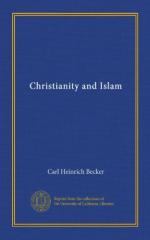The subject from different points of view: limits of treatment
The nature of the subject: the historical points of connection between Christianity and Islam
A. Christianity and the rise of Islam:
1. Muhammed and his contemporaries
2. The influence of Christianity upon the development of Muhammed
3. Muhammed’s knowledge of Christianity
4. The position of Christians under Muhammedanism
B. The similarity of Christian and Muhammedan
metaphysics during the
middle ages:
1. The means and
direction by which Christian influence affected
Islam
2. The penetration
of daily life by the spirit of religion;
asceticism,
contradictions and influences affecting the
development
of a clerical class and the theory of
marriage
3. The theory of
life in general with reference to the doctrine
of
immortality
4. The attitude
of religion towards the State, economic life,
society,
etc.
5. The permanent
importance to Islam of these influences: the
doctrine
of duties
6. Ritual
7. Mysticism and the worship of saints
8. Dogma and the development of scholasticism
C. The influence of Islam upon Christianity:
The manner in which
this influence operated, and the explanation
of the superiority of
Islam
The influence of Muhammedan philosophy
The new world of European Christendom and the modern East
Conclusion. The historical growth of religion
Bibliography
CHRISTIANITY AND ISLAM
A comparison of Christianity with Muhammedanism or with any other religion must be preceded by a statement of the objects with which such comparison is undertaken, for the possibilities which lie in this direction are numerous. The missionary, for instance, may consider that a knowledge of the similarities of these religions would increase the efficacy of his proselytising work: his purpose would thus be wholly practical. The ecclesiastically minded Christian, already convinced of the superiority of his own religion, will be chiefly anxious to secure scientific proof of the fact: the study of comparative religion from this point of view was once a popular branch of apologetics and is by no means out of favour at the present day. Again, the inquirer whose historical perspective is undisturbed by ecclesiastical considerations, will approach the subject with somewhat different interests. He will expect the comparison to provide him with a clear view of the influence which Christianity has exerted upon other religions or has itself received from them: or he may hope by comparing the general development of special religious systems to gain a clearer insight into the growth of Christianity. Hence the object of such comparisons is to trace the course of analogous developments and the interaction of influence and so to increase the knowledge of religion in general or of our own religion in particular.




